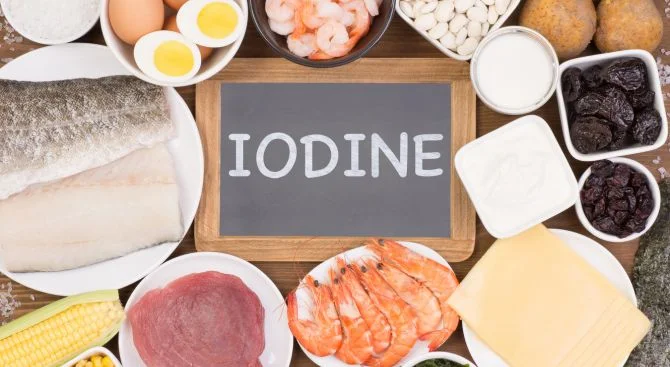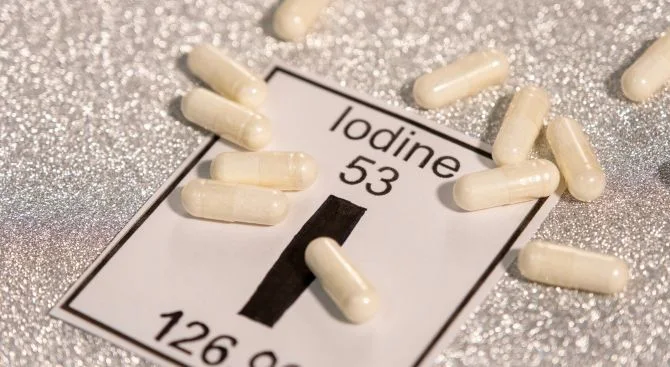Iodine: Exploring Its Health Benefits, Potential Risks, Recommended Dosage

Iodine is a vital mineral that is essential for sustaining overall health and well-being. While the human body cannot produce iodine on its own, it requires this mineral for proper thyroid functioning, hormone regulation, and various other important processes. This article delves into the health benefits, potential risks, recommended dosage, and other relevant information related to iodine.
Health Benefits of Iodine

- Thyroid Function: Iodine is necessary for the synthesis of thyroid hormones thyroxine (T4) and triiodothyronine (T3), which are crucial for regulating metabolism, growth, and development. Adequate iodine intake helps prevent low thyroid hormone production and hypothyroidism.
- Development during Pregnancy: Pregnant women require higher levels of iodine to support proper brain development in their babies. Insufficient iodine during pregnancy has been linked to intellectual delays and lower IQ in children. Breastfeeding women also have increased iodine needs to ensure optimal brain development in infants.
- Cognitive Function in Children: Sufficient iodine intake is associated with improved cognitive function in children. Inadequate iodine levels can increase the risk of intellectual disabilities in developing babies and infants.
- Healthy Birth Weight: Adequate iodine intake during pregnancy may contribute to a healthy birth weight. Studies have shown that increasing iodine intake can correct goiters (enlarged thyroid) and lead to improved birth weight.
- Lowering the Risk of Goiters: Goiters, often caused by a lack of iodine in the diet, can be prevented by ensuring sufficient iodine intake.
- Potential Treatment for Fibrocystic Breast Disease: Some research suggests that iodine may help reduce the symptoms of fibrocystic breast disease, a noncancerous condition characterized by painful lumps in the breasts. However, further research is needed to support this claim.
- Thyroid Cancer Treatment: Radioactive iodine treatment can be beneficial for individuals with thyroid cancer. Radioactive iodine destroys thyroid cells, including cancerous ones, that were not removed through surgery.
Potential Risks of Iodine
- Iodine Toxicity: Excessive iodine intake can lead to iodine toxicity, which can manifest as symptoms ranging from nausea and vomiting to a weak pulse and delirium.
- Hyperthyroidism: In some cases, excessive iodine consumption can result in an overactive thyroid, known as hyperthyroidism.
- Goiter Formation: While adequate iodine intake helps prevent goiters, excessive iodine levels may actually contribute to their formation.
- Thyroid Cancer Risk: High levels of iodine in the diet have been associated with an increased risk of thyroid inflammation and thyroid cancer.
- Medication Interactions: Iodine supplements may interact with certain medications, such as anti-thyroid medications and ACE inhibitors, potentially affecting thyroid hormone production and potassium levels.
Recommended Dosage of Iodine
The recommended daily iodine intake varies based on age and life stage. The general guidelines are as follows:- Birth to 6 months: 110 micrograms
- 7 months to 1 year: 130 micrograms
- Children up to 8 years: 90 micrograms
- Children 9 to 13: 120 micrograms
- Teens and adults: 150 micrograms
- Pregnant women: 220 micrograms
- Breastfeeding women: 290 micrograms
Good Food Sources of Iodine
There are specific foods that are particularly high in iodine. Here are some examples:
- Seaweed: Seaweed, such as kelp, nori, and wakame, is one of the richest natural sources of iodine. It can provide significantly high levels of iodine compared to other food sources.
- Fish and Seafood: Certain types of fish and seafood are good sources of iodine. Examples include cod, tuna, shrimp, salmon, and sardines. The iodine content can vary depending on the species and the iodine levels in the waters they inhabit.
- Dairy Products: Dairy products like milk, yogurt, and cheese can contribute to iodine intake, especially if they come from cows or goats that have been fed iodine-fortified feed.
- Eggs: Eggs contain a moderate amount of iodine, with the iodine content mainly concentrated in the yolk. The specific iodine levels may vary based on the hen's diet.
- Iodized Salt: Iodized salt is a common dietary source of iodine. It is regular table salt that has been fortified with iodine. Using iodized salt in cooking and seasoning can help increase iodine intake.
- Fortified Foods: Some processed foods, such as bread, cereals, and certain types of saltwater fish, may be fortified with iodine to enhance their nutritional value.
It's important to note that the iodine content in foods can vary depending on factors such as soil iodine levels, farming practices, and processing methods. If you have specific dietary concerns or conditions, it's advisable to consult with a healthcare professional or registered dietitian for personalized guidance on iodine-rich food choices.
Disadvantages of Iodine
The disadvantages of iodine can include:
- Iodine Allergies: Some individuals may be allergic to iodine, leading to skin rashes, hives, or more severe allergic reactions. It's essential to be cautious when using iodine-based products in such cases.
- Excessive Iodine Intake: Consuming too much iodine can result in hyperthyroidism or thyroid dysfunction. Excessive iodine can have adverse effects on thyroid health, causing an overactive thyroid or other related issues.
- Thyroid Dysfunction: While iodine is essential for thyroid function, an imbalance in iodine intake can lead to thyroid problems, such as hyperthyroidism or hypothyroidism, which can impact metabolism and overall health.
- Risk During Pregnancy: Excessive iodine intake during pregnancy can lead to thyroid dysfunction in both the mother and the developing fetus. Proper monitoring of iodine intake is crucial for expectant mothers.
- Interaction with Medications: Iodine can interact with certain medications, particularly those used for thyroid conditions or contrast agents for medical imaging. It's important to inform your healthcare provider about your iodine intake if you are taking any relevant medications.
- Iodine-Induced Hyperthyroidism: Some individuals may be more susceptible to iodine-induced hyperthyroidism, especially when consuming iodine-rich foods or supplements.
- Gastrointestinal Distress: In some cases, excessive iodine intake can lead to gastrointestinal discomfort, including nausea, diarrhea, or abdominal pain.
It's essential to strike a balance when it comes to iodine intake, ensuring you neither have a deficiency nor consume excessive amounts. Consulting with a healthcare professional or a registered dietitian can help you make informed decisions about your iodine intake and address any potential disadvantages.
Should i Take iodine at Night or Morning
The timing of when to take iodine can depend on your personal preference and any specific instructions from a healthcare provider. Iodine is often found in dietary sources, such as iodized salt or foods like fish and dairy, and doesn't typically need to be taken as a supplement.
If you are taking an iodine supplement for a specific medical reason, it's generally recommended to follow your healthcare provider's instructions regarding when to take it. Some supplements may be taken in the morning, while others may be recommended for the evening. The timing can depend on factors like the specific type of supplement, your individual needs, and any potential interactions with other medications or supplements you may be taking.
To ensure that you are taking iodine in a way that best suits your health needs, it's essential to consult with a healthcare professional or follow the guidance provided on the product label. They can provide you with personalized recommendations based on your health status and any specific requirements you may have.
Post a Comment